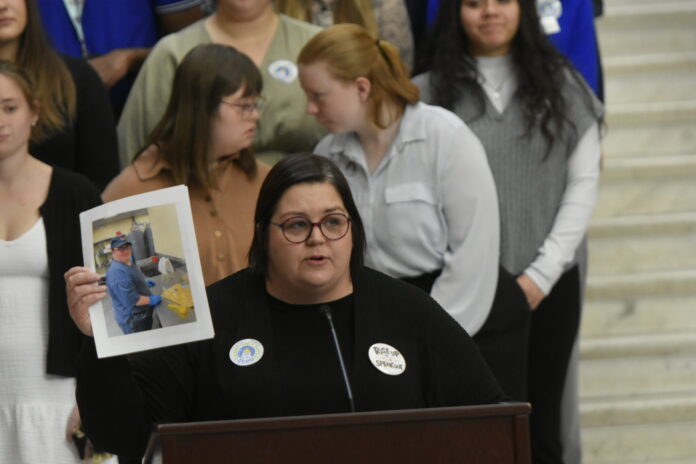
(Georgia Recorder) — A bipartisan measure that would phase out a program that allows employers to pay people with disabilities below the minimum wage – including less than $1 an hour – is gaining traction in the Senate.
A bill sponsored by Republican Statesboro state Sen. Billy Hickman was recently unanimously voted out of committee over the objections of one of the few centers left in Georgia that are still participating in the program.
Called the “Dignity and Pay Act,” the proposal would give providers two years to end their participation in a federal program that was originally created in the 1930s to encourage employers to hire veterans returning home from war with disabilities.
Participation in the program has been waning in Georgia, with eight remaining centers currently paying about 250 workers less than minimum wage and many of them are already taking steps to move away from the program.
Hickman pointed to the Georgians with disabilities who can be found working at grocery stores, coffee shops, restaurants and other places as proof that his bill would not put any employer out of business.

“Our state is, as we well know and we say all the time, has one of the strongest economies in the country. Ensuring that all working Georgians receive at least minimum wage is just common sense and respect,” Hickman said to his colleagues at a committee meeting this month.
“This bill is about dignity and fairness, ensuring that people with disabilities are paid at least what we consider the bare minimum wage for all of the workers,” he also said.
Crystal St. Pierre-Stackpole, who has advocated for Hickman’s bill at the Capitol, said her brother’s first job sorting recyclable items from garbage earned him less than minimum wage.
Now she said her brother works at Zaxbys, earning $180 every two weeks. St. Pierre-Stackpole says that through earning a regular wage, her brother “feels like an equal.” She said he loves the process of depositing his check and spends his earnings on gifts for loved ones and nutritional teas.
“This is my brother Tra St. Pierre,” said Crystal St. Pierre-Stackpole at a press conference last month, holding up a photo of her brother. “He couldn’t be here today. Why, you might ask? Because he’s at work.”
The holdouts
The proposal to end the practice of paying workers with disabilities subminimum wage easily cleared the House last year. Hickman says his chamber just ran out of time last year to finish sending it to the governor’s desk, and this year, he’s getting a jumpstart. The Senate Insurance and Labor Committee has approved the bill, making it eligible for a vote in the full Senate. A bill has to make it through at least one chamber by March 6 to have a smooth path to becoming law.
This year, one provider that is still using the program has come out publicly to oppose the bill.
Leigh McIntosh, CEO of Creative Enterprises in Gwinnett County, argues that cutting off their access to the program would likely cause her to close a workshop where job “trainees” are currently paid based on their output. Over the course of the week, about 80 people work at the shop. That represents about one-third of all the workers with disabilities in the program in Georgia.
Creative Enterprises contracts with companies to provide assembly-type work, like packaging kits that test for food intolerances. McIntosh said her shop productivity average was about 10% – which she said would earn the worker about 80 cents an hour – and she argued that having to pay minimum wage would put the center “in the hole too much financially.”
The workers could make $8 an hour but none of them do, McIntosh said. She says that is because once someone reaches the 50% level of productivity, the next step is for them to find a job.
When asked why she was struggling to transition away from the program that others are leaving, McIntosh said she is “trying to preserve a choice.” She dismissed the push for people with disabilities to work in the community as one of the “fads” she says she has witnessed in her four decades as a provider.

“We’re taking choices away,” she said in an interview. “The push has been to say, number one, everyone can work, and that’s just not true. Not everyone’s going to work, even in the non-disabled community; it’s just not a true statement.”
She also argues that for some people, the point of being at her workshop isn’t the work or the pay. Some people, she said, are looking for a safe place to go.
McIntosh was backed up by Ted Ward, who is the brother of a 33-year-old woman with Down Syndrome who works at Creative Enterprises’ production facility.
“While (my sister) does not receive minimum wage for this work, there is not a better moment in her week than when she receives a paycheck for this work,” Ward told lawmakers. “Some may find it preposterous that she does not receive full minimum wage, but that overlooks the fact that she possesses the intellectual capacity of a 6- to 7-year-old.”
‘It’s no more of a fad than women in the workplace’
Advocates championing Hickman’s bill say workshops like the one at Creative Enterprises represent an outdated model that denies people with disabilities the opportunity to live a full life and contribute to their community.
They argued that many organizations have already moved away from the program, and they highlighted McIntosh’s salary – $236,409, according to a public document acquired by ProPublica – as proof that Creative Enterprises could likely make the change as well.
D’Arcy Robb, executive director of the Georgia Council on Developmental Disabilities, said the broader goal is making employment in the community the first option – but not the only option – for a person with disability who is working age and receiving publicly funded services.
She and others say it’s about matching a person with a job that fits their strengths or helping them become self-employed.
“We want people to be part of society, which means, if you love plants, cool, let’s help you get a job at a greenhouse. If you like children, cool, let’s help you get a job at a daycare. That’s what we really want. And it’s best for people and it’s best for communities,” Robb said.
Robb rejected the notion that this shift is a passing trend.
“When you think about employment opportunities that have opened to any other group, for example, like women coming into the workforce. Would we call that a fad? There were probably some people at the time who did, but it turned out not to be,” Robb said Friday.
“It’s easier to keep doing the same thing than it is to make change,” Robb said, referring to the workshops. “Anyone who’s still doing this is an outlier. There’s a lot of technical assistance and support. There are providers all over the state who’ve made the turn. It’s no more of a fad than women in the workplace.”
Hickman’s bill has broad support. Sen. Randy Robertson, a Cataula Republican, said, “I don’t think I’ve seen a better piece of legislation yet” this year when it advanced out of committee. And Sen. Sally Harrell, an Atlanta Democrat who is a leading voice on disability issues in the Legislature, argued the bill’s phase-out approach is “very kind” to providers.
But Harrell also says there is more the state can do to help people with disabilities join the state’s workforce.
“As a state, we need to do a better job at learning how to provide the right training and supports to people living with intellectual and developmental disabilities so that we can help them find the right work and learn how to work,” Harrell said.
Georgia Recorder intern Heather Fields contributed to this report.






